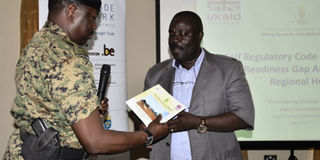Shs1.5 billion self-regulation code launched to facilitate maize trade

Lt Gen Charles Angina, the deputy coordinator Operation Wealth Creation, hands over a copy of the self regulatory code to Mr Robert Mwanje, the vice chairman of The Grain Council of Uganda in Kampala yesterday. PHOTO BY JONATHAN ADENGO
Kampala- Six grain warehouse hubs in Uganda will benefit from the implementation of the self-regulation code which aims at reducing post-harvest losses due to poor storage at farm level.
The Grain Council of Uganda (TGCU), supported by United Kingdom Department for International Development (DfID), through TradeMark East Africa (TMEA) - an aid for trade organisation, has launched a warehouse code and research report on Uganda’s maize grains regional hubs.
According the report, maize export in Uganda has faced challenges often due to the poor quality of grains with more than 30 to 40 per cent of total harvest ending up as poor grain. The development of a self-regulatory code of conduct is a step in the right direction in overcoming the challenges.
Mr Henry Musisi, the acting executive director at TGCU, said Uganda has perennially produced more grain than any country in the region which can be exported.
However, most of the grain is of poor quality and as such does not fetch enough revenue for the farmers.
He said the improvements in warehousing will assist small holder farmers, who make up more than 60 per cent of maize producers in Uganda, to increase their production, improve grain quality and reduce post-harvest losses.
Speaking at the launch at Golf Course Hotel yesterday, Mr Moses Sabiti, the country director at TMEA said they are trying to address key challenges that impact the grain sector particularly looking at how they can contribute to creation of jobs and ending poverty.
“Our focus is that our traders access regional and even international markets and they are better to better prices for their produce,” he said.
They are setting up a logistics hub in Gulu to reduce challenges of warehousing for goods destined for South Sudan, DR Congo. With the logistics hub set up, we are able to bring customs services nearer.
Lt Gen Charles Angina, the deputy coordinator Operation Wealth Creation, who presided over the launch said any community can only achieve what they intend to achieve when they get organised.
He said the initiative is moving towards getting synergies to enhance quality production of grain for the competitive market.
“We have been producing poor quality grains because we do not have a proper code of conduct. But now that we have this in place we shall be able to compete favourably in the region,” he said.
He said six regional hubs will address the quality of grain challenges across the country.
The upgrading of the warehouse hubs was part of a larger programme supported by the DfID through TMEA valued at $431,211 (about Shs1.5 bilion).
In addition to development of the warehouse hubs, the programme also aimed to link 7,000 farmers to certified warehouses, increase awareness on grain quality standards and strengthening maize value chain coordination and advocacy.
The programme offers a comprehensive solution in grain testing, storage and management of warehouses there by generating efficiencies to help Ugandan to achieve greater food security.




